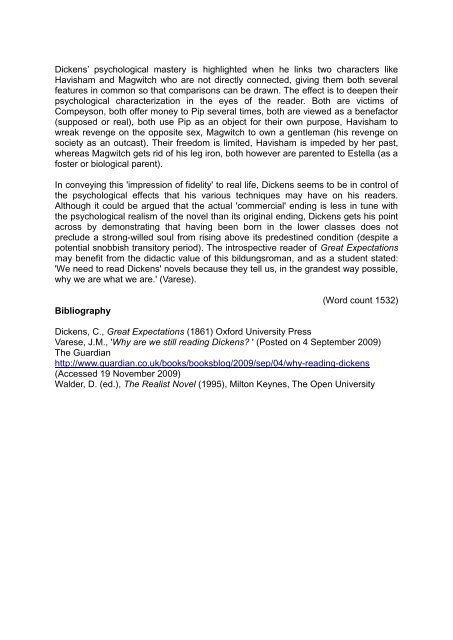Psychological Realism in Dickens' Great Expectations ... - lembeye.fr
Psychological Realism in Dickens' Great Expectations ... - lembeye.fr
Psychological Realism in Dickens' Great Expectations ... - lembeye.fr
You also want an ePaper? Increase the reach of your titles
YUMPU automatically turns print PDFs into web optimized ePapers that Google loves.
Dickens’ psychological mastery is highlighted when he l<strong>in</strong>ks two characters like<br />
Havisham and Magwitch who are not directly connected, giv<strong>in</strong>g them both several<br />
features <strong>in</strong> common so that comparisons can be drawn. The effect is to deepen their<br />
psychological characterization <strong>in</strong> the eyes of the reader. Both are victims of<br />
Compeyson, both offer money to Pip several times, both are viewed as a benefactor<br />
(supposed or real), both use Pip as an object for their own purpose, Havisham to<br />
wreak revenge on the opposite sex, Magwitch to own a gentleman (his revenge on<br />
society as an outcast). Their <strong>fr</strong>eedom is limited, Havisham is impeded by her past,<br />
whereas Magwitch gets rid of his leg iron, both however are parented to Estella (as a<br />
foster or biological parent).<br />
In convey<strong>in</strong>g this 'impression of fidelity' to real life, Dickens seems to be <strong>in</strong> control of<br />
the psychological effects that his various techniques may have on his readers.<br />
Although it could be argued that the actual 'commercial' end<strong>in</strong>g is less <strong>in</strong> tune with<br />
the psychological realism of the novel than its orig<strong>in</strong>al end<strong>in</strong>g, Dickens gets his po<strong>in</strong>t<br />
across by demonstrat<strong>in</strong>g that hav<strong>in</strong>g been born <strong>in</strong> the lower classes does not<br />
preclude a strong-willed soul <strong>fr</strong>om ris<strong>in</strong>g above its predest<strong>in</strong>ed condition (despite a<br />
potential snobbish transitory period). The <strong>in</strong>trospective reader of <strong>Great</strong> <strong>Expectations</strong><br />
may benefit <strong>fr</strong>om the didactic value of this bildungsroman, and as a student stated:<br />
'We need to read <strong>Dickens'</strong> novels because they tell us, <strong>in</strong> the grandest way possible,<br />
why we are what we are.' (Varese).<br />
Bibliography<br />
(Word count 1532)<br />
Dickens, C., <strong>Great</strong> <strong>Expectations</strong> (1861) Oxford University Press<br />
Varese, J.M., 'Why are we still read<strong>in</strong>g Dickens? ' (Posted on 4 September 2009)<br />
The Guardian<br />
http://www.guardian.co.uk/books/booksblog/2009/sep/04/why-read<strong>in</strong>g-dickens<br />
(Accessed 19 November 2009)<br />
Walder, D. (ed.), The Realist Novel (1995), Milton Keynes, The Open University


